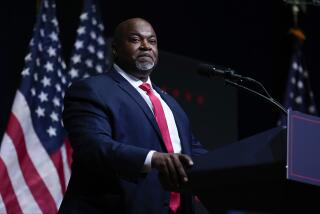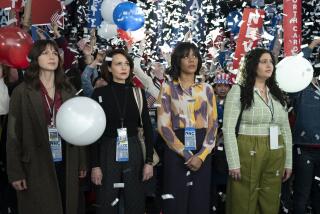Lights, Cameras, Pundits! On to New Hampshire
- Share via
Something we can count on every four years is that media by the kadzillions will laser-lock on the Iowa precinct caucuses and afterward ask the Why? question. So. . . .
“Why were we there?” Larry King asked Bob Woodward on CNN Tuesday night.
We, in this case, being anyone who is anybody covering, dissecting and milk-feeding the infant 1996 presidential campaign via TV, radio, print and probably the Internet, too. In other words, the swarms that spent early February tailing and taking the pulses of Republican hopefuls as they crisscrossed wintry Iowa--a small farm state that is not close to being a microcosm of the United States--in pursuit of their party’s presidential nomination. The same media crowd that is now in New Hampshire.
The host of “Larry King Live” appeared earnest, his question to Woodward bearing the sort of inner chaos you detect in a serial slayer who is unable to explain the irresistible impulse to murder. King seemed to be pleading: Please stop us before we overkill again.
Fat chance. Even as King spoke, the next target, Tuesday’s New Hampshire primary, was already being stalked.
Woodward, an author and an editor at the Washington Post, didn’t have an answer about Iowa. In fact, he had no clear answer about anything. He was less Deep Throat than Strep Throat as King sought to draw him out on the book he was writing about the GOP candidates--about the stuff they’re really made of, not the horse-race hustle--that he said was due out in May.
King wanted to know what Woodward had learned from his research. It was a fair question, one that the stony journalist addressed with such self-magnified weightiness that you worried about him caving in the floor and falling through. To paraphrase a bit, Woodward explained professorially (mentally he appeared to be lighting a pipe and puffing deeply) that you have to admire these guys for running, and you have to take them seriously, and you have to seriously admire them for being taken seriously by running in a serious manner. Or something like that.
Later, a wee-hours caller from Switzerland wondered which of the GOP candidates Woodward found most interesting. Another fair question. “I think when you travel with these people, when you get to know them . . . “ Woodward began, appearing perilously near imparting information before losing it all and launching a rambling treatise that he concluded by boldly declaring, “I find all of them interesting.”
At this point you surmised either that Woodward was being secretive or was writing the dullest book on presidential politics in the history of publishing. “Well said . . . gonna be a great book,” King told his guest at the end of the hour, seeing an empty glass as full.
As for why the media and especially TV have lavished so much attention on the Iowa caucuses--an indulgence being repeated in New Hampshire, whose Democratic primary was won by Paul Tsongas of Massachusetts in 1992, with whazisname, Bill Clinton, finishing second--nothing was well said.
Now, egghead writers whose beat is entertainment know absolutely zero about politics, so this is probably all wet. But is it possible, just possible, that at least some media often cover elections by rote, that they blitzed Iowa in 1996 and are echoing themselves in New Hampshire for no reason other than they did it in 1992? And in 1988? And in 1984? And in 1980? Is it possible that they instinctively return to where they have been regardless of a story’s merits? That in election years, TV, in particular, becomes a cottage industry of self-interests that feeds on its own creation (shades of the O.J. Simpson case)?
Been there, did it, know how to do it again, see ya next time.
Where the media have gone before includes Iowa, a state with a mere seven electoral votes. A state supplying just a shade more than 1% of the 1,990 delegates to the party’s nomination convention (in August). A state low on diversity. A state with half the national average of crime and unemployment. A state where George Bush was the GOP’s caucuses winner in 1980 but didn’t get the nomination. A state where Bob Dole won in 1988 and didn’t get the nomination.
Nevertheless, lights, cameras, pundits. We’re told Iowa is critical. For those who nurture the event every four years, undoubtedly it is.
*
For Iowans, the caucuses boost the local economy and toggle on a rare media spotlight that fleetingly liberates them from the stereotype of tall corn--a glint of a moment when the rest of the United States hears and listens to them. For media, the caucuses are a tornado of political juices and a campaign starting point (after a couple of meaningless state straw polls), an occasion to attach early political labels to candidates that they must live up to or down to, or be judged accordingly--last week’s darling (Steve Forbes, for example) becoming this week’s dunce.
Media perceptions drive America’s perceptions. In particular, we absorb what TV says, if only because its reporters, sages and cameras say it so incessantly. By only barely winning in Iowa, therefore, Sen. Bob Dole of Kansas is vulnerable, close loser Patrick J. Buchanan is the real winner, third-place finisher Lamar Alexander is riding higher, fourth-place Forbes is just about cooked, fifth-place Sen. Phil Gramm of Texas is a goner.
And on Wednesday Gramm was, telling supporters, “When the voters speak, I listen. . . .”
The voters who spoke in Iowa totaled less than 100,000.
Political pros say it’s a mistake to judge the significance of the Iowa caucuses by the state’s size or demographics, that what it provides mostly is Big Mo--momentum.
But if it’s true that the caucuses are important because they supply momentum, it follows that they supply momentum only because someone says they’re important. And just who outside of Iowa proclaims that, through their words and massive presence? The media, who cite that alleged importance to justify their coverage.
And to what end?
“Iowa . . . has contributed to the trivialization of the nominating process,” Drake University Professor Hugh Winebrenner writes in his book, “The Iowa Precinct Caucuses.” He adds: “The results of the Iowa process are unreliable but that is overlooked by the media in their fervid quest for hard news. Media interpretations, often based on contrived events like Iowa, become the reality of presidential campaigns and determine the rules by which the candidates play the game.”
Already the game, with its media machinery, has moved northeast to another state with dubious credentials. Viva New Hampshire!
Yet don’t be surprised if Larry King is on TV next week again asking someone, “Why were we there?”
More to Read
Get the L.A. Times Politics newsletter
Deeply reported insights into legislation, politics and policy from Sacramento, Washington and beyond. In your inbox twice per week.
You may occasionally receive promotional content from the Los Angeles Times.









